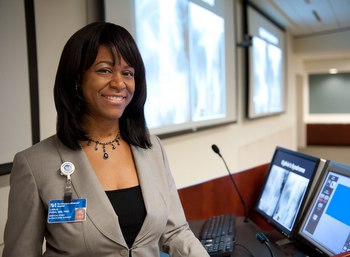Northwestern Inventor Wins Highest Presidential Award
Researcher’s breast simulators will measure doctors’ ability to detect breast cancer
 |
| Carla Pugh, MD, PhD, associate professor of surgery at Feinberg, has been awarded a Presidential Early Career Award for Scientists and Engineers for her novel research to develop the first physical test that measures medical students’ and physicians’ ability to perform a clinical exam of breasts and diagnose cancer. |
Carla Pugh, MD, PhD, a Northwestern Medicine researcher, inventor and surgeon, has been awarded the Presidential Early Career Award for Scientists and Engineers (PECASE) for her novel research to develop the first physical test that measures medical students’ and physicians’ ability to perform a clinical exam of breasts and diagnose cancer.
The PECASE is the highest honor bestowed by the United States government on science and engineering professionals in the early stages of their independent research careers.
Pugh is an associate professor of surgery and director of the Center for Advanced Surgical Education at Northwestern University Feinberg School of Medicine and an acute care surgeon at Northwestern Memorial Hospital. She also is a member of the Robert H. Lurie Comprehensive Cancer Center of Northwestern University.
Pugh will be invited to the White House to meet President Barack Obama and attend an awards ceremony.
“It is inspiring to see the innovative work being done by these scientists and engineers as they ramp up their careers — careers that I know will be not only personally rewarding but also invaluable to the nation,” President Obama said.
Awardees are selected for their pursuit of innovative research at the frontiers of science and technology and their commitment to community service as demonstrated through scientific leadership, public education or community outreach.
Pugh and her team are building a set of 100 sensor-enabled breast examination simulators – all with simulated abnormalities – that can be used to define performance standards for the clinical breast examination. With a National Institutes of Health grant, she is currently analyzing which palpation techniques are most effective for diagnosing cancer. She believes palpation techniques used in the breast examination can be quantified and improper techniques that result in missed diagnoses can be identified using sensor-enabled breast models.
Overall, the technologies developed in Pugh’s laboratory focus on clinical skills assessment and developing performance standards for a number of clinical and surgical skills.
In addition to her current research, Pugh also has developed exam simulators with sensor technology to teach medical students whether they have the right touch for pelvic and prostate exams, among the most sensitive and difficult exams. When students place their hands inside Pugh’s pelvic or prostate simulators, internal sensors measure their pressure and detect if they’re in the proper spot. The pioneering sensor technology for the pelvic simulator is a patented product now being used by nursing and medical schools around the country.
Another sensor technology prototype Pugh developed teaches residents and obstetricians how to properly deliver a baby whose shoulder is stuck in the birth canal, a rare and difficult procedure at which they don’t get much training. She also developed a simulator to help students learn how to insert a breathing tube down a patient’s airway in an emergency.
Pugh was recognized for her accomplishments in a National Library of Medicine exhibit titled “Opening Doors: Contemporary African American Surgeons.” She was the only living Chicago surgeon represented in the exhibit. The exhibit honors African-American trailblazers and educators in contemporary medicine.
Members of the media, please contact Marla Paul via e-mail or at (312) 503-8928 for more information about this story.






